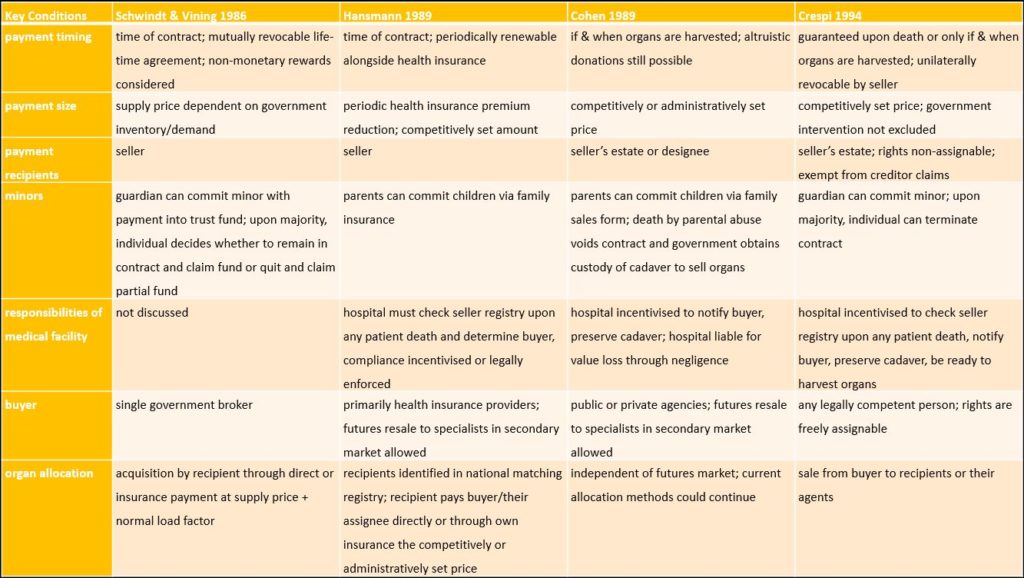Futures contracts for donations after death appear to ease major ethical concerns in the debate about payment for human organs. Yet, such proposals are incompatible with current law.
Futures contracts, i.e. agreements to pay a specified sum at a certain time, as financial incentives for cadaveric organ donations have been discussed for over three decades. The most significant proposals are outlined in the table below. These provide the buyer with the right, not obligation, to harvest organs. By excluding living donations, futures abate criticisms around dehumanisation, exploitation of the poor, hasty decision-making for quick cash and post-operative consequences. Unlike the current system, they allow the donation decision to be made at an uncritical time – when the individual is healthy and has time to contemplate. Not only is the deceased’s autonomy over their own body preserved, but the family does not need to be approached urgently at an emotionally extremely strained time upon the death of their beloved.

Nevertheless, offering indirect incentives through futures does neither maximise the donor’s benefits nor autonomy over spending. Direct cash payments to the living seller would allow them to spend the money as they please. Altruistic donors may prefer to donate the gain to charity if the system does not allow for unpaid donations. However, the risk of never using a person’s organs is too high for buyers to enter such arrangements. High prices would need to be charged per organ to compensate for losses, which would inevitably result in an allocation bias towards wealthy patients. Altogether, if payment was legally possible, futures pay-outs for harvested organs after death are considered a more efficient solution than direct cash awards.
If you missed part 2 of this series, click here.
References:
- BOYER, J.R., 2012. Gifts of the Heart . . . and Other Tissues: Legalizing the Sale of Human Organs and Tissues. Brigham Young University Law Review, pp. 313-341.
- COHEN, L.R., 1989. Increasing the supply of transplant organs: the virtues of a futures market. The George Washington law review, 58(1), pp. 1-51.
- CRESPI, G.S., 1994. Overcoming the Legal Obstacles to the Creation of a Futures Market in Bodily Organs. Ohio State Law Journal, 55(1), pp. 1-77.
- HANSMANN, H., 1989. The Economics and Ethics of Markets for Human Organs. Journal of health politics, policy and law, 14(1), pp. 57-85.
- LOVE, A.J., 1997. Replacing Our Current System of Organ Procurement with a Futures Market: Will Organ Supply Be Maximized? Jurimetrics, 37, pp. 167.
- SCHWINDT, R. and VINING, A.R., 1986. Proposal for a Future Delivery Market for Transplant Organs. Journal of health politics, policy and law, 11(3), pp. 483.
3 thoughts on “Organ donation part 3/4 – The futures that never happened”
Comments are closed.